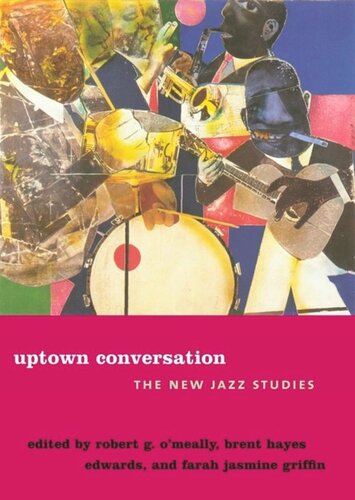

Most ebook files are in PDF format, so you can easily read them using various software such as Foxit Reader or directly on the Google Chrome browser.
Some ebook files are released by publishers in other formats such as .awz, .mobi, .epub, .fb2, etc. You may need to install specific software to read these formats on mobile/PC, such as Calibre.
Please read the tutorial at this link: https://ebookbell.com/faq
We offer FREE conversion to the popular formats you request; however, this may take some time. Therefore, right after payment, please email us, and we will try to provide the service as quickly as possible.
For some exceptional file formats or broken links (if any), please refrain from opening any disputes. Instead, email us first, and we will try to assist within a maximum of 6 hours.
EbookBell Team

0.0
0 reviewsUptown Conversation asserts that jazz is not only a music to define, it is a culture.Original essays cover jazz historiography, the political stakes of telling the story of the music, and its cultural import, including the music's experimental wing and revisionary takes on familiar figures in the canon: Thelonious Monk, Miles Davis, Duke Ellington, and Louis Armstrong. The book also considers how settings outside the United States have transformed the music.
Jackson Pollock dancing to the music as he painted; Romare Bearden's stage and costume designs for Alvin Ailey and Dianne McIntyre; Stanley Crouch stirring his high-powered essays in a room where a drumkit stands at the center: from the perspective of the new jazz studies, jazz is not only a music to define—it is a culture. Considering musicians and filmmakers, painters and poets, the intellectual improvisations in Uptown Conversation reevaluate, reimagine, and riff on the music that has for more than a century initiated a call and response across art forms, geographies, and cultures.
Building on Robert G. O'Meally's acclaimed Jazz Cadence of American Culture, these original essays offer new insights in jazz historiography, highlighting the political stakes in telling the story of the music and evaluating its cultural import in the United States and worldwide. Articles contemplating the music's experimental wing—such as Salim Washington's meditation on Charles Mingus and the avant-garde or George Lipsitz's polemical juxtaposition of Ken Burns's documentary Jazz and Horace Tapscott's autobiography Songs of the Unsung—share the stage with revisionary takes on familiar figures in the canon: Thelonious Monk, Miles Davis, Duke Ellington, and Louis Armstrong.